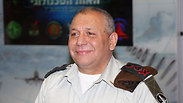
IDF chief: Israel willing to share intelligence with moderate Arab states
Eisenkot gives rare interview to Saudi newspaper, calling for international coalition against Iran, adding Jerusalem and Riyadh 'in complete agreement' about Tehran.
IDF Chief of Staff Gadi Eisenkot gave a rare interview to a Saudi newspaper, calling for an international coalition against Iran.
"You can see the Iranian plan is to control the Middle East from Iran through Iraq and from there to Syria and Lebanon, and through another path in the Gulf from Bahrain to Yemen and the Red Sea. We must stop that from happening in the region," Eisenkot told the London-based Elaph in an interview published on Thursday.
"There's an opportunity to form a new international coalition in the region with President Trump. We need to carry out a large, comprehensive strategic plan to stop the Iranian threat," he added.
In a surprising statement, Eisenkot said the IDF was willing to share intelligence with the moderate Arab states, including Saudi Arabia.
"We're willing to exchange information with the moderate Arab nations, including intelligences, in order to deal with Iran," Eisenkot said. "We're willing to share information if the need arises. There are many shared interests between us and Saudi Arabia."
The IDF chief said he was hopeful by declarations made by US President Donald Trump about the need to stop Iran's missile program and its entrenchment in Syria and Iraq.
"On this matter, there is complete agreement between us and Saudi Arabia, which has never been an enemy we fought or that fought us," he said.
"When it concerns the Iranian axis, there is complete agreement between us and them. I participated in a military chiefs meeting in Washington, and when I heard the Saudi representative speak, I found that his views about Iran were completely aligned with mine," he added.
Eisenkot talked about the involvement of the two superpowers—the United States and Russia—in Syria's civil war and the complexities it brings with it. "The US is trying to strengthen and support the moderate Sunni axis without putting boots on the ground. On the other hand, there is a Russian policy that only considers Russian interests in Syria. The Russians made an alliance with (Syrian President) Assad, Iran and Hezbollah, while at the same time allying themselves with the Americans in the war against ISIS," he said.
The IDF chief stressed Israel's policy in Syria is of non-intervention. "The claims we're aiding the Nusra Front and its ilk in the Golan are baseless. They're our enemies, just like ISIS," Eisenkot said.
Israel, he said, demands that Hezbollah, Iran and the Shiite militias leave Syria. "We won't allow Iranian presence. We've warned them against building factories or military bases" in Syria, he stressed.
The IDF chief said Israel had no intention of initiating a war against Hezbollah, "but we will not accept any strategic threat on Israel," further noting he didn't think escalation was very likely.
Majdi Halabi, the Elaph reporter who interviewed Eizenkot, expressed hope in a conversation with Ynet after Eizenkot's rare interview that "maybe it will lead to something in Israel's relations with Saudi Arabia, who knows."
Halabi went on to deny claims that the interview was initiated by the Saudi government.
"It's wasn't planned by the government, we're an independent newspaper. It is true that the owner is Saudi and is close to the king, but they do not give him the orders," he asserted. "The timing of the interview was determined by the chief of staff's office. We asked for it a few months ago and last week they informed us that it was authorized.
"For many years, chiefs of staff did not give interviews to Arab media, and that means that we are a reliable and influential news source," he added. "We made history in the Arab world."
Halabi noted that the main reason for the interview was public interest in the Arab world, especially in regards to Israel and Soudi Arabia's common grounds.
"It is no secret that Israelis and Saudis share the same problems with Iran and Hezbollah," he said. "The defense minister, the prime minister, the chief of staff and the Saudi foreign minister, Adel al-Jubeir, all say that.
"(That is why—ed) we wanted to interview the chief of staff of the Israeli army. It sparked debate even in places that oppose Saudi Arabia.
"We asked questions that interested the Arab world, especially the Gulf and Lebanon. I chose the questions. It was held face to face in his office over a cup of coffee. It was very relaxed. I felt confident and asked all the questions I wanted to."












